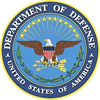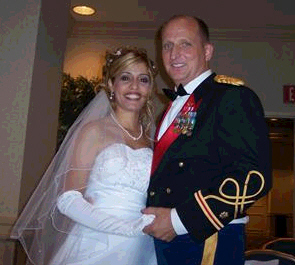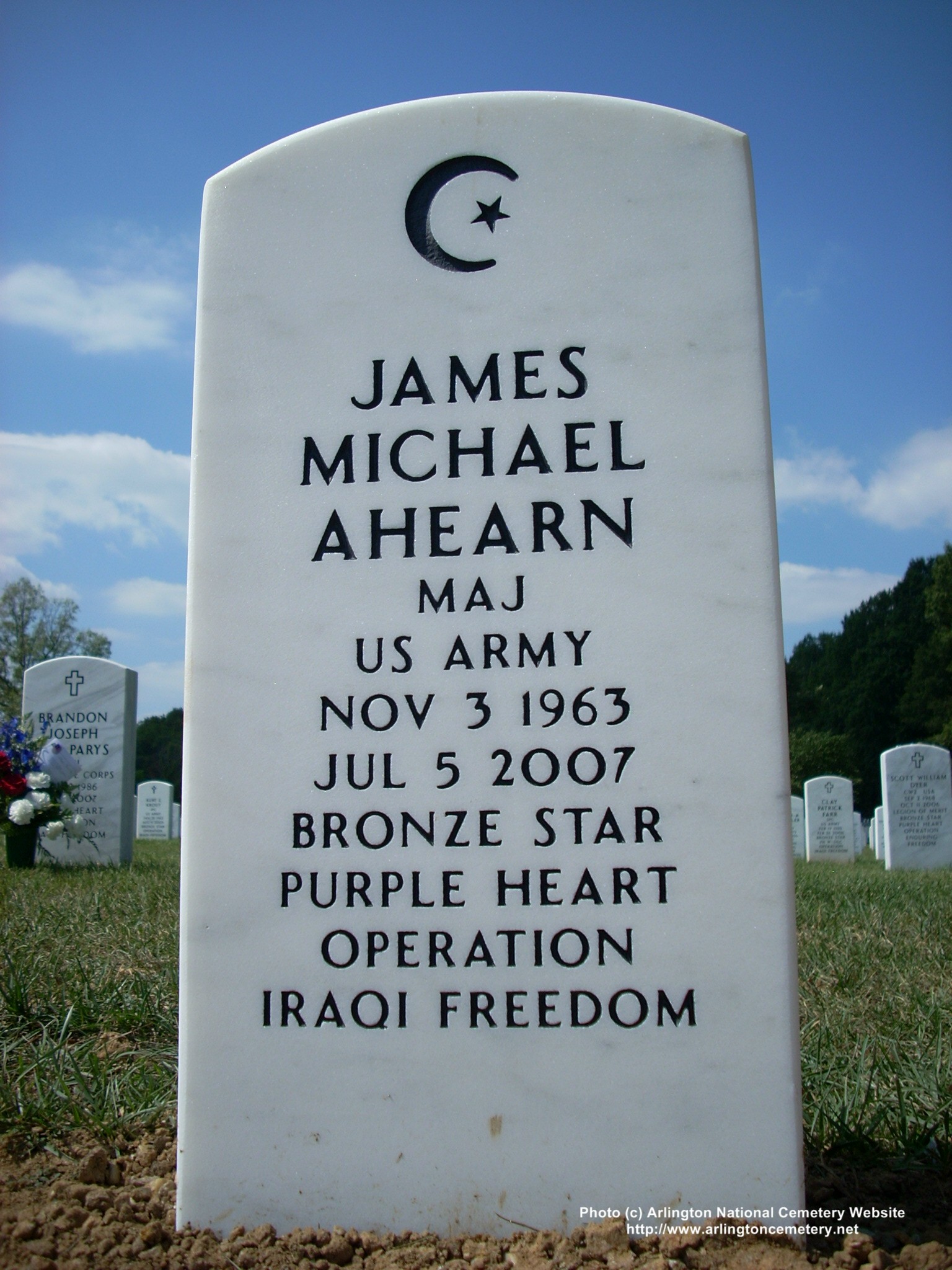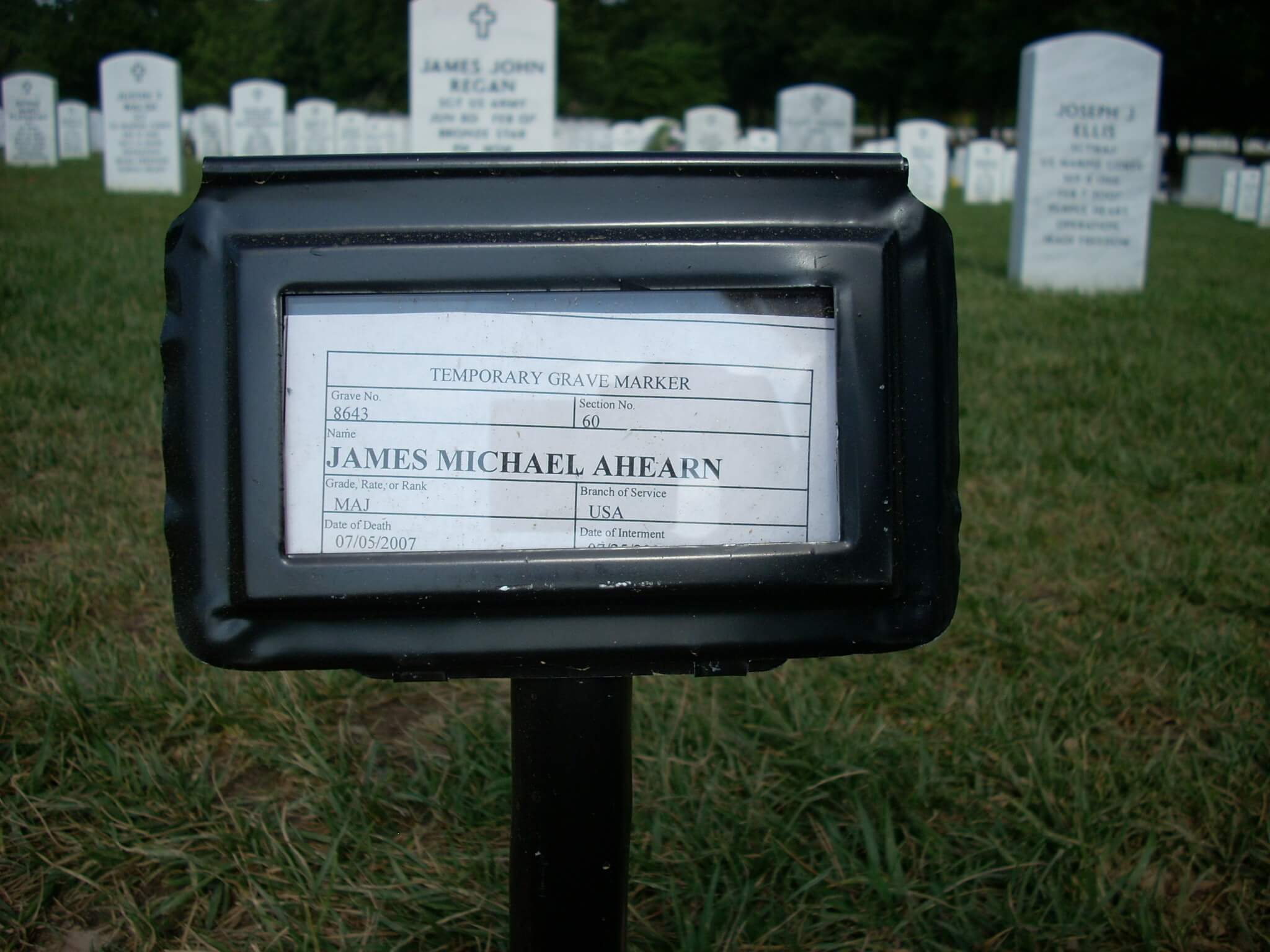U.S. Department of Defense
Office of the Assistant Secretary of Defense (Public Affairs)
News Release
IMMEDIATE RELEASE No. 845-07
July 8, 2007
DoD Identifies Army Casualties
The Department of Defense announced today the death of two soldiers who were supporting Operation Iraqi Freedom. They died July 5, 2007, when their vehicle struck an improvised explosive device in Baghdad, Iraq. They were assigned to 96th Civil Affairs Battalion, 95th Civil Affairs Brigade, Fort Bragg, North Carolina.
Killed were:
- Major James M. Ahearn, 43, of California
- Sergeant Keith A. Kline, 24, of Oak Harbor, Ohio
9 July 2007:
Her mother warned her: A soldier’s business is war. There is no safety. There are no guarantees.
But the Iraqi daughter loved the American officer.
And so, in 2005 — two years after they met in Iraq — she left her country to move to his and become his wife.
And on Thursday — four years after her mother’s warning — Lena Ahearn became a widow.
Her husband, Major James Michael Ahearn, 43, was killed in Baghdad when his vehicle struck a roadside bomb. Sergeant Keith A. Kline, 24, of Oak Harbor, Ohio, was also killed in the attack.
“Jimmy was the greatest gift I ever had,” Lena said Sunday from the couple’s home in Raeford. “I will never regret marrying him for two years and moving to the United States.”
Ahearn, who had served in the Army for 18 years, and Kline were assigned to the 96th Civil Affairs Battalion, 95th Civil Affairs Brigade at Fort Bragg, North Carolina.
This was Ahearn’s third time in Iraq.
It was during the second tour that he met Lena. She loved the way he looked in his uniform and the way he used his own money to buy toys for Iraqi children.
When they married, Ahearn offered to convert to Islam for his bride.
“I only want you to convert if you believe in it,” Lena told him.
He did.
And he used that belief to try to bridge the cultural gap between American soldiers and the Iraqi people on his third tour of Iraq.
“He told them there are no differences between people,” Lena said.
But his message of tolerance did not reach everyone. And Lena said she is ashamed, knowing her husband died in her country at the hands of her people.
She told the casualty assistance officers that came to her home Thursday to tell her of her husband’s death that she wanted to become an American citizen.
It would have made him proud.
“He was the strongest and bravest man I ever saw in my life,” she said.
And one of the most sentimental. When he was home, Ahearn bought Lena a card, a flower and a doughnut every Sunday morning.
And on the rare occasion he forgot to buy a card, he’d hang a love note on the refrigerator or hide one in the kitchen cabinet.
Lena got her last love note in March, just before Ahearn left for Iraq. He was scheduled to return in September and to retire from the Army in 2009.
Before he left, he said one of his greatest fears was that his 17-month-old daughter, Kadi, wouldn’t recognize him when he returned.
“He was afraid always that she would forget him,” Lena said. “I hope she does not.”
19 July 2007:
The 96th Civil Affairs Battalion held a memorial for Major James M. Ahearn and Sergeant Keith A. Kline this morning at the John F. Kennedy Memorial Chapel on Fort Bragg.
Ahearn, 43, and Kline, 24 were killed in Baghdad July 5, 2007, when their vehicle struck a roadside bomb.
Both men were assigned to Company B, 96th Civil Affairs Battalion, 95th Civil Affairs Brigade.
About 300 people filled the chapel. Another 100 soldiers and friends sat under a small tent in the parking lot and watched the service on three flat-screen TVs.
Both soldier’s boots, M-4 rifles, dog tags and helmets were displayed at the front of the chapel. They were flanked by the American flag and battalion colors.
“It is humbling to have soldiers with such courage and character serving in the ranks of the 95th Civil Affairs Brigade,” said Coloenl Ferdinand Irizarry, commander of the brigade. “Major Ahearn and Sergeant Kline were microcosm of all that is good about America. They don’t come any better.”
11 July 2007:
Tragic End to A Soldier’s Love Story
He was her heart and soul and now Lena Ahearn is dealing with the fact that she has lost her loved one in Iraq.
Fort Bragg Army Major Jim Ahearn known as Jimmy by many died in a roadside bombing last Thursday. Monday his wife, who was born in Iraq, spoke to Eyewitness News about her husband’s life with his family—and his death.
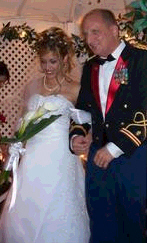
Lena Ahearn remembers the day her husband, Major James Ahearn, left for his third tour of duty in Iraq. He wrote a note to his family on their refrigerator bulletin board. “No matter how far we are apart, our hearts will always be together. I love you guys so much,” the soldier wrote on the note.
Jimmy died in Iraq along with another Fort Bragg soldier.
Lena is Iraqi and she met Jimmy in the Green Zone where she worked in Baghdad. They fell in love instantly. “He tried to do anything… anything you want just to make you happy,” Lena told a reporter. “Like… whenever I cry… he cried. Whenever I’m happy… he’s happy. This is the man I always dreamed of but he got to go so fast,” Lena said. Lena says she’s the first Iraqi woman to fall in love with and marry an American soldier after the war in Iraq began in 2003. Her family received death threats after the marriage. The repercussions forced her mother and sister to flee Iraq. Lena explains, “My mother and my little sister are now living in a refugee camp in a dirty little place. She has the diabetes. She have a blood pressure and she’s sick over there. My other two sisters and my brother, they stayed in Iraq and now their lives in danger too because of me.”
It’s easy to see why Lena loved her husband. He always left her flowers, cards and note around the house. “He put them on top of refrigerator, inside the refrigerator beside the milk where I have my coffee creamer in the cabinet in the kitchen. In the laundry room. Whenever I open my draw[er]. When I go to the bathroom, I brush my teeth I found one on the mirror,” Lena said. The couple has a 17-month-old daughter and Lena wants her to know how her father lived and not the horrible way he died. Lena said, “I’m kind of ashamed and embarrassing because he died in my country. So, I would love to be a citizen now.” Ahearn was one of two Fort Bragg-based members of the 96th Civil Affairs Battalion killed last week. Ahearn was 43.
9 July 2007
Iraqi wife mourns the U.S. soldier she loved
An American soldier who fell in love with an Iraqi woman in Baghdad and converted to Islam to marry her has been killed by a roadside bomb.
Major James Ahearn, 43, met his wife Lena during his second tour in Iraq when she was working in the Green Zone, the fortified American compound. They set up home near his base in Fort Bragg, North Carolina. Mrs Ahearn yesterday mourned the death of her husband and said she was “ashamed and embarrassed” he had been killed at the hands of her countrymen.
“Jimmy was the greatest gift I ever had,” she said from the couple’s home, where she lives with their 17-month-old daughter Kadi. “I will never regret marrying him and moving to the U.S.”
Major Ahearn was killed during his third tour in Iraq. A civil affairs officer, he worked with Iraqis on reconstruction projects to improve basic facilities. He had served in the U.S. Army for 18 years and was due to retire in 2009. Mrs. Ahearn said her husband used his new Islamic faith to try to bridge the cultural gap between Americans and the Iraqis. “He told them there are no differences between people,” she said.
Before he left for Iraq a final time, he left a note on the refrigerator that said: “No matter how far we are apart, our hearts will always be together. I love you guys so much.”
Mrs. Ahearn said her family had received death threats after her wedding. Her mother and sister had been forced to flee the country but she did not regret marrying a soldier and moving to America. “He was the strongest and bravest man I ever saw.”
Shared e-mails reveal fallen GI’s dedication
19 July 2007
Jim Ahearn wasn’t sure that anyone was interested in hearing from his dead son, Major James Michael “Jimmy” Ahearn, killed July Fourth outside of Baghdad.
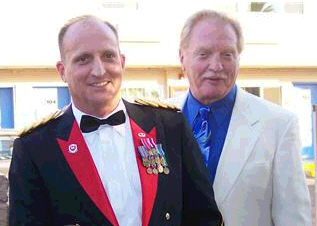
Ahearn sent copies of e-mails he’d received from his son in Iraq to everyone from the President on down. Elected officials. Political candidates. Newspaper, radio and TV reporters. When we first talked earlier this week, he hadn’t heard back from any of them.”My son passionately believed in what he was doing over there,” Jim told me. “Whether I completely agreed with him or not doesn’t matter, and honestly I will never express my views. But in honor of my son I will express his.”
Major Ahearn was 43 years old and on his third tour of duty. During the initial battle to secure Baghdad, he received several medals for bravery. He met his future wife, Lena, around that time. She is an Iraqi and was working with the military as a translator. They have a daughter, Kadi. His father is a retired FBI agent who headed the Phoenix office during his final years on the job. Jim Ahearn watched his son rise from an enlisted man in the first Gulf War to an officer charged with developing relationships with Iraqi civilians. Major Ahearn wasn’t a naive, wide-eyed kid. He was a mature soldier who was convinced that he understood what was at stake in the war. That’s why Jim decided to share the e-mails.
We don’t often listen to soldiers, however. For one thing, they don’t speak with one voice. In Washington this week, politicians on both sides of the aisle were able to trot out Iraq war veterans who were opposed to the conflict or in favor of it. Jimmy Ahearn didn’t have that kind of agenda. He wrote home because he wanted friends and family to know what his life was like. And why he was risking it. It’s tough to “interview” a lost soldier, but I told Jim that his son deserved to be heard. They all deserve to be heard. They’ve earned it. The least we can do, every now and then, is to listen to one of them. Like this one:
“Just wanted to let you know that I am still alive and well, despite an ever-increasing presence of grey hair!” Ahearn wrote July 3. “It’s been an exciting week, but yesterday was the best yet – we had our Fourth of July a day early. After 43 missions of nothing too exciting – a couple of firefights, but that’s to be expected – we finally met up with the big, bad IED. Some jackass initiated his little bomb as my truck was passing by (somewhat little anyway) – scared the bejesus out of me, but I’m fine. … I’m getting way too old for this; tomorrow had better be a quiet day!”
It wasn’t. A roadside bomb killed Major Ahearn and another soldier, and gravely wounded a third.
“It was July Fourth there,” his father said. “He knew that he was in a dangerous place doing dangerous work. But he loved the Army. And he didn’t want to leave a tough job to someone else.”
The son explained that view in a previous e-mail, writing, “Between the four guys on my team we have a combined sixty-six years of military experience. If we were to get the hell out of here, some poor kid would be left doing the job – and we’re already losing enough good kids. Besides, I know I keep saying this, and I’m not sure anyone stateside believes me, but there are a lot of good people here who really are trying to make a difference and need some help. There’s no doubt in my mind that if we left, they’d all be dead.
“I wish I could just sit all the Iraqi entities down in a room, pitch my plan to rid the place of Al Qaeda, and promise that the Americans will leave shortly thereafter (or at least take up positions out in the desert on the Iranian border, which the average Iraqi wouldn’t mind at all). I’ll figure out the whole Iran thing later. I never realized saving the world was so damned hard!”
Ahearn believed that the war could be won only by working with the people. “This neighborhood was attacked by a car bomb on 22 April, killed six, injured a couple dozen,” he wrote a while back. “Why? Because of their diversity; a common technique is to commit some random act of violence as a catalyst for sectarian infighting, after which either the Sunnis or Shia come out on top. There are now large swathes of Baghdad which are homogenous as a result. “Anyway, these people reacted differently. This neighborhood (Sunni, Shia, Christian and Kurd) came together. They cared for the injured, put up the homeless, built makeshift barriers around the neighborhood to prevent such a thing from happening again. “I meet a lot of well educated, modest, polite people who couldn’t care less about a Muslim religious war or global politics, they just want the electricity to come on and for their kids to be safe at school.”
Jim had a bad feeling about his son’s long stints in a war zone. Before Major Ahearn went on his last mission, his dad wrote to him: “Son, I will tell you once again that you are a good man with his head and his heart in the right place. I’m sure you’re right in your analysis and never question that. Being a selfish father, I worry about you first and the rest of the world later. Get the hell out of there as soon as you can. You’re pressing your luck too much.”
The Ahearn family received a letter from the White House a day or so ago. Jim contacted me after he read it. It surprised him. It appears to be a standard condolence that is sent to each military family that loses someone in the war, only this one included a handwritten inscription. “I read your e-mails with Jimmy,” it reads. “I was touched by your son’s courage—God bless you, Sir.” It’s signed “George Bush.”
Major James Michael “Jimmy” Ahearn will be buried in Arlington National Cemetery outside of Washington, D.C., but not for several weeks. “That wasn’t at our request,” his father told me. “Apparently, there is quite a backlog.”
Family, soldiers pay tribute to fallen comrades
20 July 2008About 300 people filled the chapel at the John F. Kennedy Memorial Chapel on Fort Bragg for the memorial service. Another 100 soldiers and friends sat under a small tent in the parking lot and watched the service on flat-screen TVs.
Kevin Ahearn’s big brother and best friend is gone.
Major James M. Ahearn, 43, was killed in Baghdad on July 5, 2007, when his vehicle struck a roadside bomb. Sergeant Keith A. Kline, 24, also was killed in the blast.
“I think he was doing exactly what he believed in,” Kevin Ahearn said.
James Ahearn and Kline were assigned to Company B, 96th Civil Affairs Battalion, 95th Civil Affairs Brigade. The battalion remembered both men Thursday morning at a memorial service at John F. Kennedy Memorial Chapel on Fort Bragg. About 300 people filled the chapel. Another 100 soldiers and friends sat under a small tent in the parking lot and watched the service on three flat-screen TVs.
Kevin Ahearn said he remembers getting e-mails from his brother in Iraq asking him to collect toys and send them to Baghdad. “He never asked for anything for himself, it was always about the kids,” Kevin Ahearn said.
Both soldiers’ boots, M-4 rifles, dog tags and helmets were displayed at the front of the chapel. They were flanked by the American flag and battalion colors.
“It is humbling to have soldiers with such courage and character serving in the ranks of the 95th Civil Affairs Brigade,” said Colonel Ferdinand Irizarry, commander of the unit. “Major Ahearn and Sergeant Kline were a microcosm of all that is good about America. They don’t come any better.” It was Ahearn’s third time in Iraq.
Major Don Sculli said Ahearn was known as “Grandpa” because he was one of the oldest soldiers in the unit. In preparation for his speech, Sculli printed out all of the messages about Ahearn on an online tribute site. “I laughed and cried when this task ran my printer out of paper,” Sculli said. Ahearn was known as a smart and compassionate leader who held himself and his soldiers to a high standard. But, most of all, he was a loving husband and father to his daughter, Khadijah. It was during his second tour that he met his Iraqi wife, Lena.
Lena said earlier this month that when he was home, Ahearn bought her a card, a flower and a doughnut every Sunday morning.
Sculli joked that when that story hit the newspaper, it put pressure on all of Ahearn’s friends. “Jimmy, buddy, you’ve got us all in trouble now,” Sculli said. “Now we’re going to have to step up our standards on Sunday morning.” . . . Ahearn will be buried in Arlington National Cemetery next week.
Fallen Muslim American Soldier MournedMajor James Michael Ahearn had a near perfect life. The 43-year-old career army officer was newly married and recently became a father for the first time. On July 5, 2007, during a routine patrol in Iraq, a roadside bomb exploded, killing Major Ahearn and his driver. For Urdu TV’s Abdul Aziz Khan, VOA’s Jim Bertel has more on this fallen American soldier.
A new dawn beckons at Fort Bragg Military Base in North Carolina. It is one of the most famous military bases in the United States and is home to the famed 82nd Airborne Division. There is also a small mosque at the base, and Muslim soldiers of the U.S. Army gathered here earlier this week to pray and mourn the loss of a fellow soldier. The soldier they are remembering is Major James Michael Ahearn. While in Iraq, Ahearn converted to Islam and married an Iraqi woman named Lena. In 2005, they moved back to North Carolina where they had a daughter and named her “Khadija,” after the wife of the Prophet Muhammad.
Eventually, Major Ahearn was sent back to Iraq. On July 5, 2007, he and his driver were killed when a roadside bomb struck their vehicle.
Chaplain Khan was sent to inform Lena Ahearn of her husband’s death. “When Major Ahearn died, the Army wanted to send a Muslim along with the casualty officer, so they contacted me,” he said. “I went with them and met his wife. Obviously, it was a huge shock for her and there was nothing I could say that would take away her pain. We were without words.”
His colleagues remember Major James Michael Ahearn as a very quiet and peaceful man. He was given an Islamic burial earlier this week at Arlington National Cemetery, the final resting place for many of America’s fallen heroes.
Inna lillahi wainna ilayhi rajighoun
“To Allah We belong, and to Him is our return” (Qur’an, surah 2, verse 156)
Major James Michael Ahearn was a civil affairs officer assigned to 96th Civil Affairs Battalion, 95th Civil Affairs Brigade (Airborne) at Fort Bragg, North Carolina.
He died July 5, 2007, from wounds sustained in an improvised explosive device attack while conducting a patrol during combat operations in Baghdad, Iraq.
Ahearn deployed to Iraq in support of Operation Iraqi Freedom as a member of a civil affairs team supporting the 4th Brigade Combat Team, 1st Infantry Division.
This was Ahearn’s second tour in support of Operation Iraqi Freedom.
He was born November 3, 1963, in Florida and was raised in California. Ahearn graduated from Diablo Valley College, Pleasant Hill, California, in 1988 with an associate degree in liberal arts and later earned a bachelor’s degree in history from Campbell University, Buies Creek, North Carolina. He entered the military service in 1989 and later completed the Basic Airborne Course at Fort Benning, Georgia. In 1994, he returned to Fort Benning and graduated from the Officer Candidate School. Following OCS, Ahearn was assigned to the 27th Engineer Brigade here. Subsequently, he served tours at Fort Stewart, Georgia, and Fort Irwin, California, as well as Korea and Kuwait. Ahearn first deployed to Iraq as an engineer officer in 2003. He also served his country in Saudi Arabia and Germany.
Ahearn’s military education also includes the Engineer Officer Basic and Advanced courses at Fort Leonard Wood, Missouri, the Civil Affairs Officer Course and the Regional Studies Course at the U.S. Army John F. Kennedy Special Warfare Center and School here.
His awards and decorations include Bronze Star for valor, Bronze Star, two Meritorious Service medals, five Army Commendation medals, two Army Achievement Medals, Korean Defense Service Medal, Humanitarian Service Medal, two National Defense Service medals, Air Reserve Forces Meritorious Service Medal, Kuwait Liberation Medal (Kingdom of Saudia Arabia), Presidential Unit Citation, Valorous Unit Award, Global War on Terrorism Service Medal, Army Service Ribbon, and the Basic Parachutist Badge.
Ahearn is survived by his wife, Lena and their daughter, Khadijah Mariam both of Raeford, North Carolina. He is also survived by his mother, Connie Ahearn of Concord, California, and his father, James F. Ahearn of Phoenix, Arizona.
In the final hours of his life on July 5, 2007, Army Major James M. Ahearn was doing what he did best: looking out for the interests of others.
From his quarters in Baghdad, he tried to assure family members in the U.S. that he was safe and upbeat. Then he headed across town to try to assure local Iraqis that eventually things could be upbeat and safe for them too, if everyone worked together. He was on his way to that neighborhood meeting when a homemade bomb blew up next to his truck. He was killed instantly, along with a Sergeant from his 95th Civil Affairs Brigade.
The neighborhood where he was killed had been car-bombed a few weeks earlier, leaving six dead and several dozen injured. The sectarian attack had been intended as a catalyst to divide residents, Ahearn explained. Instead, it had united them. “This neighborhood—Sunni, Shia, Christian and Kurd— came together. They cared for the injured, put up the homeless, built makeshift barriers around the neighborhood to prevent such a thing from happening again,” he wrote in an e-mail to family members.
Ahearn had met his future wife, Lena, in Baghdad’s Green Zone when he stopped by her family’s home to check on their welfare. She had been working at the time as a military translator.
“It was love at first sight, but we didn’t want to say it,” Lena Ahearn said. “Jimmy was the greatest gift I ever had.”
Ahearn impressed those who watched him give food to Iraqi families and things such as soccer balls to children.
“He was taking care of the Green Zone where we were staying. He was very friendly, helping everybody. He saw his job as helping rebuild, not fighting,” recalled Lena’s sister, Mariam Ghadeer.
When Lena agreed to marry him, he set out to convert to the Muslim faith so the ceremony could take place. Then he worked to bring her to the U.S.
His father, retired Phoenix-area FBI head James F. Ahearn, helped him snip through immigration red tape, eventually enlisting the assistance of Senator John McCain (R-Arizona). The couple settled in Raeford, North Carolina, near the Army’s Fort Bragg, where Ahearn’s 96th Civil Affairs Battalion was based.
His mother, Connie Ahearn, lives in Concord, California.
Seventeen months ago, Ahearn’s daughter, Kadi, was born. His redeployment to Iraq began in March, and he was due home in September. He planned to retire from the Army in 2009. Ahearn’s greatest worry, initially, was that his daughter wouldn’t remember him when he returned. But he also was concerned about the Iraqi children whom he encountered. Snapshots that he sent from Iraq nearly always depicted children, friends say. He encouraged them to ship over toys—but “no toy guns, please”—to be distributed to them. “If we can get through to the kids,” he wrote, “then maybe Kadi can visit here as a tourist instead of as a Lieutenant.”
To the end, the American Major worried more about the Iraqis’ fate than his own. “There are a lot of good people here who really are trying to make a difference and need some help. There’s no doubt in my mind that if we left, they’d all be dead,” he wrote in an e-mail to his father.
“If we were to get the hell out of here, some poor kid would be left doing the job—and we’re already losing enough good kids. “I wish I could just sit all the Iraqi entities down in a room, pitch my plan to rid the place of Al Qaeda, and promise that the Americans will leave shortly thereafter—or at least take up positions out in the desert on the Iranian border, which the average Iraqi wouldn’t mind at all. I’ll figure out the whole Iran thing later. “I never realized saving the world was so damned hard.”
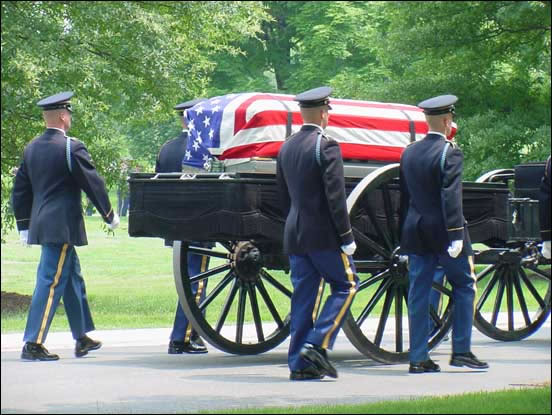
AHEARN, JAMES MICHAEL
MAJ US ARMY
- DATE OF BIRTH: 11/03/1963
- DATE OF DEATH: 07/05/2007
- BURIED AT: SECTION 60 SITE 8643
ARLINGTON NATIONAL CEMETERY
Michael Robert Patterson was born in Arlington and is the son of a former officer of the US Army. So it was no wonder that sooner or later his interests drew him to American history and especially to American military history. Many of his articles can be found on renowned portals like the New York Times, Washingtonpost or Wikipedia.
Reviewed by: Michael Howard

